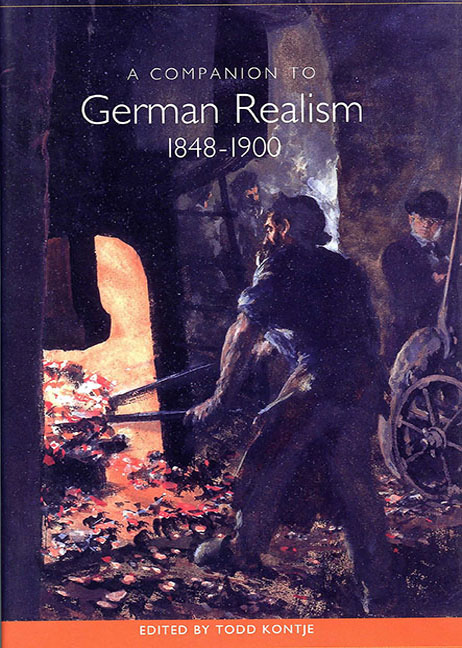Book contents
- Frontmatter
- Contents
- Preface
- Introduction: Reawakening German Realism
- Adalbert Stifter's Brigitta, or the Lesson of Realism
- Mühlbach, Ranke, and the Truth of Historical Fiction
- “In the Heart of the Heart of the Country”: Regional Histories as National History in Gustav Freytag's Die Ahnen (1872–80)
- A Woman's Post: Gender and Nation in Historical Fiction by Louise von François
- Friedrich Spielhagen: The Demon of Theory and the Decline of Reputation
- Wilhelm Raabe and the German Colonial Experience
- From National Task to Individual Pursuit: The Poetics of Work in Freytag, Stifter, and Raabe
- Das Republikanische, das Demokratische, das Pantheistische: Jewish Identity in Berthold Auerbach's Novels
- E. Marlitt: Narratives of Virtuous Desire
- The Appeal of Karl May in the Wilhelmine Empire: Emigration, Modernization, and the Need for Heroes
- Making Way for the Third Sex: Liberal and Antiliberal Impulses in Mann's Portrayal of Male-Male Desire in His Early Short Fiction
- Effi Briest and the End of Realism
- Works Cited
- Notes on the Contributors
- Index
Making Way for the Third Sex: Liberal and Antiliberal Impulses in Mann's Portrayal of Male-Male Desire in His Early Short Fiction
Published online by Cambridge University Press: 27 April 2017
- Frontmatter
- Contents
- Preface
- Introduction: Reawakening German Realism
- Adalbert Stifter's Brigitta, or the Lesson of Realism
- Mühlbach, Ranke, and the Truth of Historical Fiction
- “In the Heart of the Heart of the Country”: Regional Histories as National History in Gustav Freytag's Die Ahnen (1872–80)
- A Woman's Post: Gender and Nation in Historical Fiction by Louise von François
- Friedrich Spielhagen: The Demon of Theory and the Decline of Reputation
- Wilhelm Raabe and the German Colonial Experience
- From National Task to Individual Pursuit: The Poetics of Work in Freytag, Stifter, and Raabe
- Das Republikanische, das Demokratische, das Pantheistische: Jewish Identity in Berthold Auerbach's Novels
- E. Marlitt: Narratives of Virtuous Desire
- The Appeal of Karl May in the Wilhelmine Empire: Emigration, Modernization, and the Need for Heroes
- Making Way for the Third Sex: Liberal and Antiliberal Impulses in Mann's Portrayal of Male-Male Desire in His Early Short Fiction
- Effi Briest and the End of Realism
- Works Cited
- Notes on the Contributors
- Index
Summary
IT MAY SEEM odd to include Thomas Mann in a study of realism, considering that he wrote the majority of his novels and short fiction in the twentieth century, long after the age of realism. Indeed, some of his greatest literature appeared after the Second World War, when the movement had already found a final resting place in the lexica and encyclopedias of literary history. Nonetheless, Mann considered himself a nineteenth-century writer, heavily indebted to such masters of realism as Dickens and Dostoyevsky. With respect to male-male desire, one of the primary concerns of his works, he is even more thoroughly a product of the late nineteenth-century realist imagination than he himself admits. Deeply entrenched in Mann's early short fiction is one of the major constructions emerging from the late nineteenth-century German-speaking world that produced realism: the modern homosexual, who was discovered — some would say invented — by liberal sexologists, jurists, and activists in Germany and the Austro-Hungarian empire. Admittedly, Mann's essayistic writings actually endorse a subsequent politics of male-male desire that came to be popular with antiliberal modernist thinkers at the end of the century, but the late nineteenth-century realist view of the “third sex” fundamentally shapes his literature. Thus, Mann's fiction promotes a liberal medico-legal vision of same-sex desire that emerges from the same roots as late nineteenth-century German realism, although his nonfiction writing flirts with a modernist, early twentieth-century understanding of male-male sexuality.
The “Third Sex”
The progressive vision of same-sex desire espoused by the late nineteenth-century medical community and the homosexual emancipation movement is aptly summed up by the term “the third sex.” It is the view that men who love men and women who love women are characterized by gender inversion. In other words, members of the third sex are actually female souls dwelling in male bodies or male souls in female bodies. Karl Heinrich Ulrichs (1825–95) coined the term and articulated this conception of same-sex desire most influentially. Ulrichs can be considered the founder of the homosexual emancipation movement in Germany, the first such movement in the world. A classically trained lawyer, he openly argued for the rights of men who loved men, going so far as to appear in person at a congress of 500 lawyers in Munich in 1867 to call for the decriminalization of consensual sexual acts between adult men.
- Type
- Chapter
- Information
- A Companion to German Realism 1848-1900 , pp. 307 - 338Publisher: Boydell & BrewerPrint publication year: 2002

